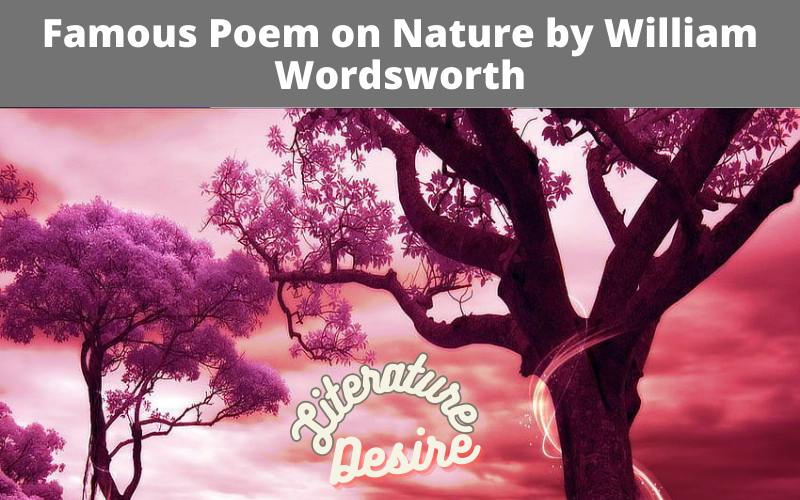In this article, we delve into a famous poem on nature by William Wordsworth, exploring its themes, significance, and the captivating imagery it presents.
Join us on this journey as we appreciate the profound connection between mankind and the natural world through the eloquent verses of this renowned poet.
Let’s explore the beauty of nature depicted in his poetry and discover the profound connection between man and the natural world.
William Wordsworth, a prominent figure of the Romantic Movement, has left an indelible mark on literature with his evocative poems that celebrate the splendor of nature.
Famous Poem on Nature by William Wordsworth
Sublimity in “Lines Composed a Few Miles above Tintern Abbey”
Tintern Abbey, a scenic location in the Wye Valley, serves as the backdrop for one of Wordsworth’s most celebrated poems.
In “Lines Composed a Few Miles above Tintern Abbey,” the poet reflects upon his return to the picturesque landscape after a five-year absence.
The poem captures the essence of nature’s beauty and its impact on the human spirit.
The Poem’s Structure and Language
Wordsworth’s poem is structured as a monologue, with the speaker addressing his younger sister, Dorothy.
The language is rich and descriptive, invoking vivid imagery that transports the reader to the enchanting surroundings.
Through his meticulous choice of words, Wordsworth conveys a sense of awe, wonder, and reverence for the natural world.
Themes Explored in the Poem
Transience and Timelessness:
The poem explores the fleeting nature of human existence in contrast to the eternal beauty of nature.
Wordsworth emphasizes the importance of cherishing the present moment while acknowledging the enduring power of the natural world.
Solitude and Reflection: Famous Poem on Nature by William Wordsworth
The speaker finds solace and tranquility in the seclusion of nature. Removed from the bustle of urban life, he experiences a deeper connection with himself and gains insights into the mysteries of existence.
The Healing Power of Nature:
Wordsworth extols the therapeutic effects of nature on the human mind and soul. He suggests that immersion in natural surroundings can rejuvenate and uplift the spirit, providing solace in times of sorrow and unrest.
Analysis of Key Verses
In the following lines from the poem, Wordsworth captures the essence of his connection with nature:
"These beauteous forms, Through a long absence, have not been to me As is a landscape to a blind man’s eye: But oft, in lonely rooms, and ’mid the din Of towns and cities, I have owed to them, In hours of weariness, sensations sweet, Felt in the blood, and felt along the heart;"
These verses exemplify Wordsworth’s ability to infuse profound emotion into his descriptions, illustrating the transformative power of nature’s beauty.
Conclusion: Famous Poem on Nature by William Wordsworth
The famous poem on nature by William Wordsworth, “Lines Composed a Few Miles above Tintern Abbey,” encapsulates the poet’s deep connection with the natural world and the profound impact it has on the human spirit.
Through his eloquent verses, Wordsworth invites readers to contemplate the timeless beauty of nature and the transformative power it holds. His poetry serves as a poignant reminder of the harmony and solace found in the embrace of the natural world.
Frequently Asked Questions
Wordsworth’s love for nature stemmed from his childhood experiences in the picturesque Lake District of England. The natural beauty he witnessed during his formative years deeply influenced his poetic sensibilities.
Apart from “Lines Composed a Few Miles above Tintern Abbey,” Wordsworth’s notable poems on nature include “I Wandered Lonely as a Cloud” and “The Prelude.”
While many Romantic poets celebrated nature, Wordsworth’s poetry stands out due to its focus on the spiritual and moral aspects of the natural world. His deep reverence for nature and its transformative power are recurring themes in his works.
Initially, Wordsworth’s poetry faced mixed reviews and criticism. However, his reputation soared in later years, and he is now regarded as one of the greatest poets in the English language.
Wordsworth’s emphasis on nature, emotion, and the individual’s experience influenced generations of poets and writers who followed. His ideas laid the foundation for the Romantic movement and continue to resonate in contemporary literature.
Wordsworth’s poetry can be found in numerous collections and anthologies. Additionally, you can explore online platforms and libraries that offer access to his complete works.



